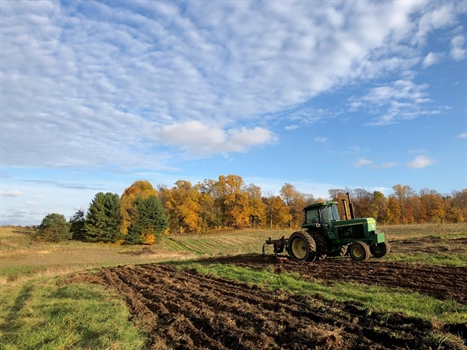Posted Nov 13, 2018

Whilst we'd love it to be true, our off-season doesn't mean several months off work in a vacation home somewhere warm, sleeping in and sipping happy hour cocktails. Even if our children would allow us the sleeping in (anyone with toddlers will understand!), the orchards still need attention, as do our winter customers, labor housing, machinery, marketing, accounting, and (sigh) taxes.
Of course, we're no martyrs (and more than happy to partake in a happy-hour cocktail, whether in warmer weather or freezing Michigan!). Think of us like friendly lizards who simply slow their pace a little in the cold until the sun warms us up again. Here is a snapshot of our 'slow-season' activities:
Review & Planning:Every day and every year is different for a farmer. Come year end, we have to assess what (and who) worked well, which plants and blocks are producing, and what the market trends are doing. We use this information to decide what to plant more or less of, what trees to order (bearing in mind we often don't receive them for a few years, and they typically don't bear fruit for another five to seven!), which plots of land need crop rotation (you often can't grow good produce in large quantities on the same plot for multiple years in a row), how many workers we will need for the coming year, when and where we are sourcing them from.
Pruning & Crop Protection:Winter is a great time to prune as the trees have gone into 'dormancy' (stored all their nutrients and energy in their roots) and have no leaves so tree structure can be easily assessed, and the coming spring will release all the energy stored to allow the tree to heal its pruning wounds and spur new growth. There are also some crops that require winter protection, for example laying down and covering our blackberries.
Ground Repair & Preparation:After harvest and before the snow is when we must do a lot of ground repair and preparation for the coming seasons. This includes removing old or dead trees and crops, tilling top soil, planting ground cover for nutrient ratio correction and top soil maintenance as well leveling and spacing rows for future plantings.
'Winterizing' & Maintenance:All of our vehicles and labor housing require 'winterizing' (think clearing all pipes, roofs and rubbish from the season, days of power-washing anda lotof anti-freeze), not just to make it through winter but in preparation for next spring when the merry-go-round kicks off once more!
Paperwork:Like all businesses, we have bills to pay, late payments to chase, reporting to complete, and (again, sigh), taxes and audits to prepare for.
Marketing & Selling:We are constantly striving to please existing customers and reach new ones, and as such try to keep abreast of our marketing, branding, networking and online presence. As well as this, we are still actively selling all winter, including direct from the farms to larger wholesale customers, and delivering up to twice per week in to Chicago restaurants. We alsodeliver pre-ordersfor retail customers for pick-up from the Green City Indoor Market on select Saturdays through winter.
Continuing Education:Like all sectors, farming technology, best practice, legislation and consumer requirements are constantly changing. To stay up-to-date, in conformance and in demand, we devote much of our time in winter to attending trade shows, conferences, lectures and sharing information with other farmers.
So whilst harvest might be limited to "the season", farming is most definitely year-round!
by Bae Schilling, adapted from Mick Klug Farm newsletter.